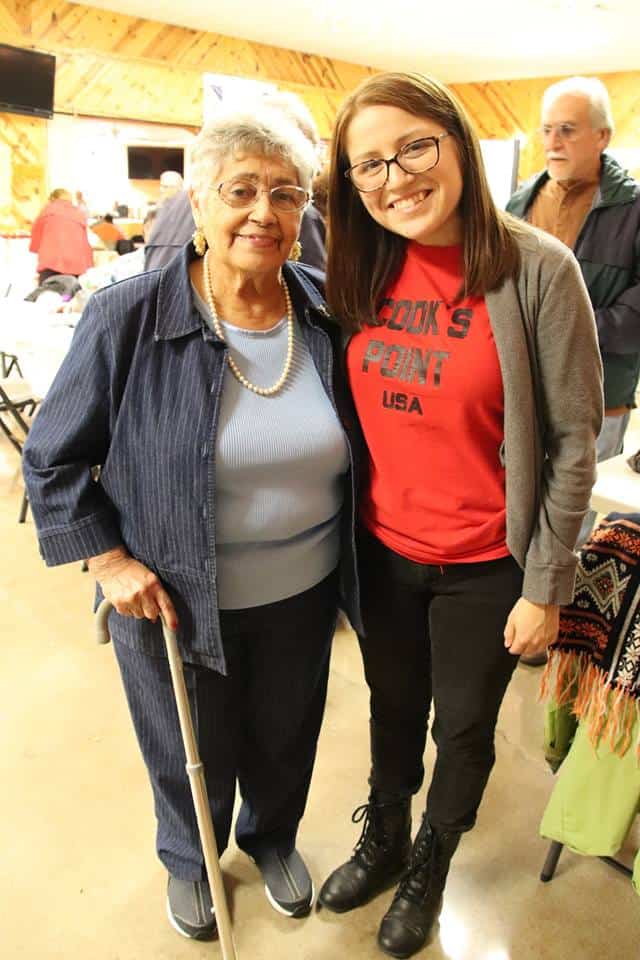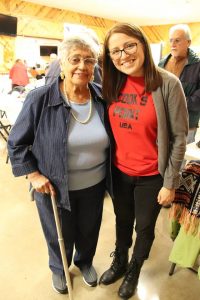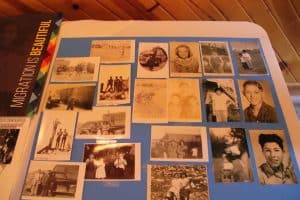Below is a reflection from Micaela Terronez, Olson Graduate Assistant, on a recent talk about her interest in the Mexican barrios of the Quad Cities at a local community gathering in Davenport, Iowa. She will be giving a version of this talk at “Workers’ Dream for an America that ‘Yet Must Be’ Struggles for Freedom and Dignity, Past and Present” March 30th 9:00 – 3:30 in Rm 101 Kollros Auditorium Biology Building East.
Despite my family’s history in the barrios, this was my first time attending the Cook’s Point/Holy City Reunion. The reunion took place at the League of United Latin Americans (LULAC) Council #10 hall in Davenport, Iowa. It began with a brief introduction of the night followed by a prayer from a local Catholic priest. Afterwards, the lights were dimmed for a candle lighting honoring past residents of the barrios. As names were called, families and descendants placed a candle in front of a decorated alter in remembrance of their loved ones. I was amazed by the number of individuals in the room, walking up as each name was called. In all, there were over 200 individuals in attendance! Then, it was my turn to take the podium.
My talk discussed my early interest in the barrios, as well as my findings in the Iowa Women’s Archives. I reflected on the Mujeres Latinas materials at the University, as well as the current use of the collections in classroom instruction. I argued that these stories are still relevant to students today as they explore their own pasts. I recalled one of my favorite classroom experiences instructing a group of 20 Latino/a/x students from Upward Bound, a program that brings first-generation students from the state to experience life as a college student for six weeks. The students gravitated toward stories of migration in the Iowa’s Women Archives, and I saw firsthand how archival materials can resonate with students and the potential impact on self-identity. Several students read aloud the speeches and writings of Ernest Rodriguez in Spanish, while others pointed to where their families migrated from on a reproduced map of Mexico and the United States. As marginalized communities continue to face challenges of social economics, racism, and violence, students and others can find comfort in these stories and see themselves as history makers, resilient in the face of adversities. My talk ended with a bilingual poem by Luis Valdez to acknowledge the recent migrants and refugees escaping environments of violence and fear in their homelands. Their stories may be lost, purposely destroyed, or criticized. For many, a culture and history cannot be easily suitcased for safekeeping. Thus, I asked the room to continue sharing stories vastly and to actively support today’s migrants and refugees by speaking out about their stories, as well. The more we do so, the more that we are actively acknowledging and reproducing migrant experiences.
Like my own family gatherings, there was a lot of food and music throughout the evening, as well as discussions and laughter amongst families and friends. In all, I was overwhelmed at the extent of togetherness within the room despite years of separation and unknown faces. Additionally, the night highlighted a performance by the Quad Cities Ballet Folklorico, a Mexican folk dance troupe of students with many also descendants of the barrios. Despite the many great moments at the reunion, my favorite moment of the evening occurred at the end of the event as one of my nieces asked me, “What are we doing here? What is Cook’s Point?” I smiled, quickly got up, and showed her the numerous photographs that scattered the room of past relatives and descendants of the barrios. I realized then that the reunion served as an additional way to engage and learn more about the rich histories of this area. From here on out, I plan to continue attending the reunion and connecting the barrio histories to my family and others.
Tú eres mi otro yo. You are my other me. Si te hago daño a ti, If I do harm to you, Me hago daño a mi mismo. I do harm to myself. Si te amo y respeto, If I love and respect you, Me amo y respeto yo. I love and respect myself.
-Luis Valdez


